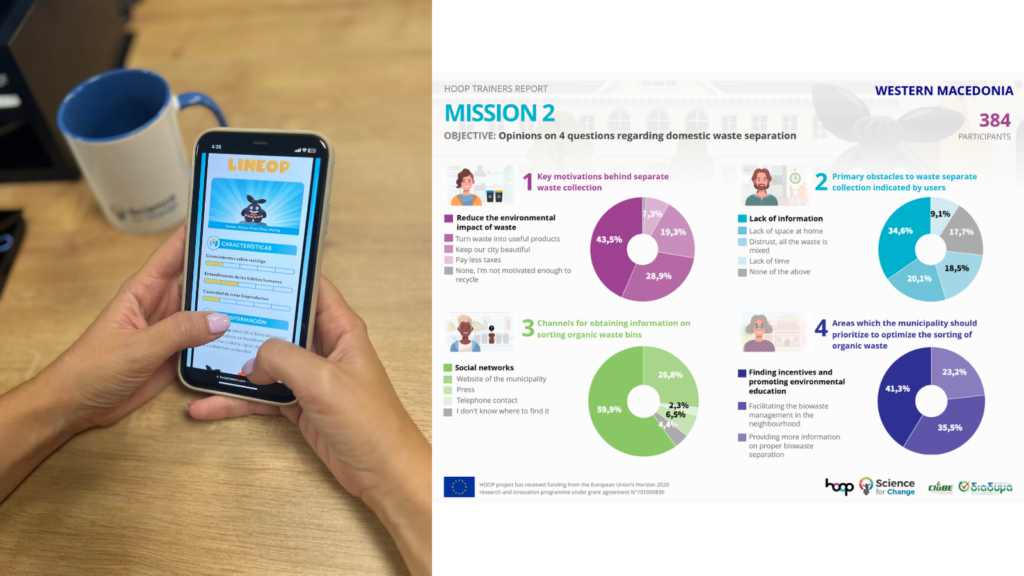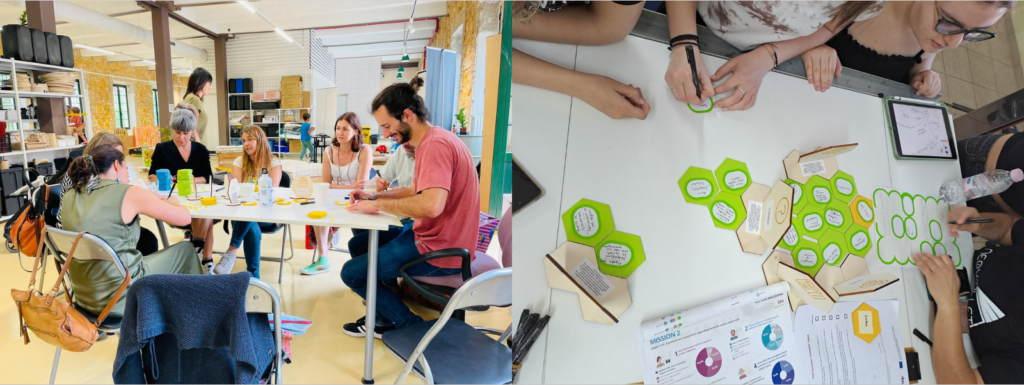1296 trainees, using the HOOP Trainers App, unleashed the power of the HOOP digital avatar to convert biowaste into bioproducts through three challenging missions. With zest, 164 participants analysed the game data in the Biowaste Club Meetings of Murcia, Western Macedonia Region, the Region of Lazio and Münster, co-creating proposals for an enhanced biowaste collection system across four key areas: resource and waste management strategies, sustainable production and consumption, education and awareness, and policy. The future of biowaste is now, and citizen-driven innovation is key!
Throughout the HOOP Trainers game, participants trained Dubiop by embarking on three missions, each tackling a distinct common challenge of the HOOP Lighthouse cities and regions identified in previous co-creation sessions: 1) Addressing disinformation regarding waste separation; 2) Identifying priority actions for optimising the separate collection of the OFMSW centred in diagnosing and reinforcing local motivations, overcoming local obstacles, and innovating in their communication strategies and 3) Analysing the social acceptance of bioproducts.

Biowaste separation challenges identified by the HOOP Trainers App users
Regarding the quantitative results obtained from the HOOP Trainers App across all the Lighthouses, the waste items causing the most uncertainty among participants vary from one territory to another. However, some recurring items include diapers, ceramics, and greasy pizza boxes. Across all participating Lighthouses, the primary motivations for implementing separate waste collections were consistent. The overarching goals were to reduce the environmental impact of waste and contribute to the transformation of waste into bioproducts. Although the main obstacles encountered differed slightly among Lighthouses, they all shared global links to logistical challenges (both at home and in the broader context), a lack of information, and distrust issues. In terms of communication, users consistently identified each municipality’s website and social media platforms as the most common channels for obtaining information on waste sorting. All the detailed results can be found at the HOOP Virtual Academy and in the D6.4 Outcome reports of the codesigned Citizen Science Interventions.
Improvement proposals based on the HOOP Trainers’ outcomes emerged during the Biowaste Club Meetings
The HOOP Trainers’ outcomes were transformed into local improvement proposals in the Biowaste Club Meetings (BCM), which serve as collaborative spaces where citizens and other stakeholders regularly exchange ideas for advancing towards circularity. By analysing the HOOP Trainers’ outcomes, a deeper understanding of citizens’ perspectives on biowaste separation, acceptance of bioproducts, and perspectives for a circular city were attained. This knowledge enabled BCM participants to co-produce a myriad of innovative ad hoc solutions grouped in four main areas: resource and waste management strategies, sustainable production and consumption, education and awareness, and policy. The detailed recommendations can be found in the HOOP Virtual Academy and in the D6.4 Outcome reports of the codesigned Citizen Science Interventions.

During the co-creation sessions designed and conducted by the HOOP partner Science for Change participants emphasised the importance of waste separation at home, suggesting measures like installing compost bins in accessible locations and incorporating strategic bins in public spaces. Recommendations also included providing suitable labelled waste bins for families, recycling bins in apartment buildings and incorporating separate collection spaces in new home designs. Practical measures for accessible waste separation also included creating clear disposal guidelines.
Creative strategies for sustainable waste management were also identified, such as creating urban gardens with composting facilities and introducing a rewarding system for responsible waste disposal. Education and awareness-raising were key themes, with suggestions for improved labelling, packaging materials information, and recycling awareness for all age groups. Influencer’s engagement and social media content were proposed to promote recycling participation.
The importance of prioritising reuse over recycling was also emphasised, with actions like choosing local and seasonal foods, advocating for second-hand purchases, and involving artists in transforming trash into art. Participants also highlighted the need to increase government funding for environmental initiatives to incentivize responsible waste management.
The rich dialogues unfolded during the sessions underscore the vital role of integrating both virtual and physical realms to create an inclusive and accessible space where citizens can openly share their ideas on crucial sustainability matters, including waste separation, recycling strategies, education, and creative initiatives that drive the transition toward circularity.
What’s next?
Following the initial Citizen Science interventions, the HOOP Trainers App has been adapted to the HOOP Lighthouses Greater Porto and Kuopio to suit their requirements and both cities are evaluating how to use the App.
Are you interested in Citizen Science, co-creation and gamification? You can contact Science for Change for more information: hello@scienceforchange.eu.
